- Latest articles
When thoughts of worthlessness creep in, try this…
He reeked. His filthy, starving body wasted away like his squandered inheritance. Shame engulfed him. He had lost everything—his wealth, his reputation, his family—his life was broken. Despair consumed him. Then, suddenly, his father’s gentle face flashed across his mind. Reconciliation seemed impossible, but in his desperation, he “set off and went to his father. But while he was still far off, his father saw him and was filled with compassion; he ran and put his arms around him and kissed him. Then the son said to him: ‘Father, I have sinned against Heaven and before you; I am no longer worthy to be called your son.’…But the father said…‘this son of mine was dead and is alive again; he was lost and is found!’ And they began to celebrate” (Luke 15:20-24).
Accepting God’s forgiveness is hard. Admitting our sins means admitting we need our Father. And as you and I wrestle with guilt and shame from past offenses, Satan the accuser assaults us with his lies: “You are unworthy of love and forgiveness.” But the Lord calls us to reject this lie!
At baptism, your identity as a child of God was stamped on your soul forever. And just like the prodigal son, you are called to discover your true identity and worthiness. God never stops loving you, no matter what you have done. “I will not reject anyone who comes to me” (John 6:37).
You and I are no exceptions! So, how can we take practical steps to accept God’s forgiveness? Seek the Lord, embrace His mercy, and be restored by His powerful grace.
Seek the Lord
Find your nearest church or adoration chapel and meet the Lord face to face. Ask God to help you see yourself through His merciful eyes with His unconditional Love.
Next, make an honest and courageous inventory of your soul. Be brave and look at Christ on the Crucifix as you reflect—bring yourself to the Lord. Admitting the reality of our sins is painful, but an authentic, vulnerable heart is ready to receive the fruits of forgiveness.
Remember, you are a child of God—the Lord will not turn you away!
Embrace God’s Mercy
Wrestling with guilt and shame can be like trying to hold a beach ball under the surface of water. It takes so much effort! On top of this, the devil often leads us to believe we are unworthy of God’s love and forgiveness. But from the Cross, Christ’s blood and water flowed from His side to cleanse, heal, and save us. You and I are called to radically trust in this Divine Mercy. Try saying: “I am a child of God. Jesus loves me. I am worthy of forgiveness.” Repeat this truth every day. Write it somewhere you see often. Ask the Lord to help you release yourself into His tender embrace of mercy. Let go of the beach ball and surrender it to Jesus—nothing is impossible for God!
Be Restored
In the Sacrament of Confession, we are restored by God’s graces of healing and strength. Fight against the devil’s lies and meet Christ in this powerful Sacrament. Tell the priest if you struggle with guilt or shame, and when you say your act of contrition, invite the Holy Spirit to inspire your heart. Choose to believe in God’s infinite mercy as you hear the words of absolution: “May God give you pardon and peace, and I absolve you of your sins in the name of the Father, and of the Son, and of the Holy Spirit.” You are now restored in the unconditional love and forgiveness of God!
Despite my failures, I ask God every day to help me accept His love and forgiveness. We may have fallen like the prodigal son, but you and I are still God’s sons and daughters, worthy of His endless love and compassion. God loves you, right here, right now—He gave up His life for you because of love. This is the transforming Hope of the Good News! So, embrace God’s forgiveness and dare to courageously accept His Divine Mercy. God’s inexhaustible compassion awaits you! “Fear not, for I have redeemed you; I have called you by name, you are mine” (Isaiah 43:1).
'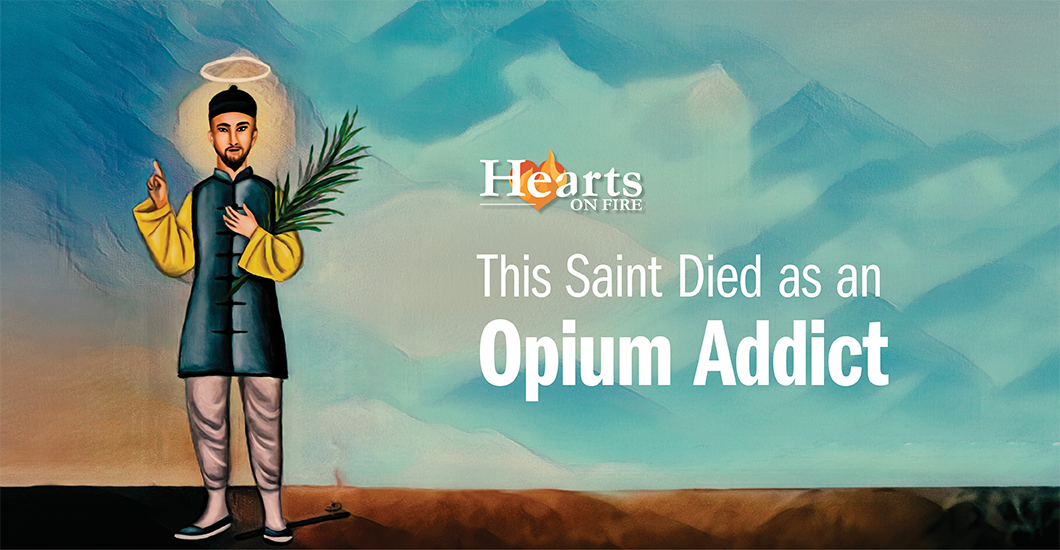
The Chinese Boxer Rebellion in the 1900s killed nearly 32,000 Chinese Christians and 200 Western Missionaries. Among these devoted Christians who gave their life for their faith, Saint Mark Ji Tianxiang stands out because, at the time of his death, he was an opium addict who had not received the Sacraments for 30 long years.
Ji was raised in a devout Christian family, and he was a respected and charitable doctor in his community. Fate be blamed, the opium he took to abate a disturbing stomach ailment took hold over him, and he was addicted to it in no time.
Though he went to frequent Confession, Ji found himself in the grips of a powerful addiction that refused to succumb to any means of resistance. His parish priest and confessor eventually told him that he could not continue to repeat the same sin in Confession anymore. Confession requires a conscious resolve to repent and sin no more, and this repeated sin, in the 19th century, was not understood as an illness. He was henceforth restricted from receiving the Sacraments, but he continued visiting the Church and stayed true to the Lord’s ways. He remained sincere to his faith because He believed in a Merciful Father.
Many assumed that he would be the first to deny the Lord when faced with the threat of persecution. But along with his son, grandchildren, and daughters-in-law, he persevered till the very end. In fact, Ji provided spiritual consolation to his fellow Christians as they were imprisoned and awaiting execution.
Stories record that as they were dragged to prison, his grandson, shaking with fear, asked him, “Grandpa, where are we going?” He calmly and jubilantly answered: “We’re going home.” He went to his death, singing the Litany of the Blessed Virgin Mary. Pope John Paul II canonized him in the year 2000.
'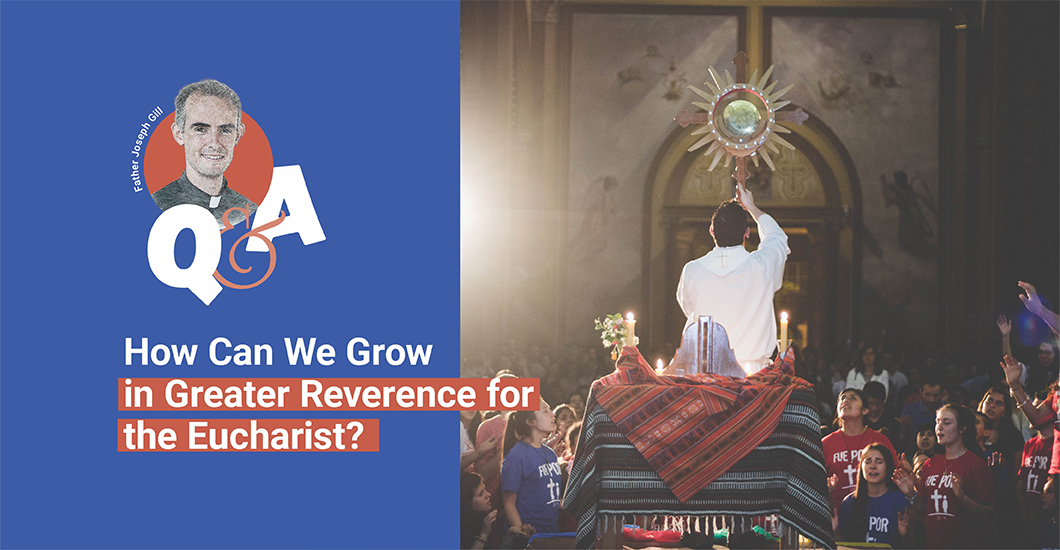
Q – The United States is in the midst of a three-year “Eucharistic Revival” campaign to try to inspire greater belief in Christ’s Real Presence. What are some practical ways that my family can practice greater reverence for the Eucharist?
A – A recent study said that only one-third of Catholics believe that Jesus Christ is truly present in the Holy Eucharist. In response, the Church is trying to reawaken what Saint John Paul II calls “Eucharistic amazement”—an awe and wonder in the Real Presence: Jesus, hidden yet truly present in the Eucharist.
How can we do this as a family? Here are some suggestions:
First, presence
If we knew that someone would be freely giving out a thousand dollars every week at a certain location, we would make sure to be there. Yet we receive something far more valuable—God Himself. The God Who created all the gold in the universe. The God Who loved you into existence. The God Who died to purchase your eternal salvation. The God Who alone can make us happy in eternal life.
The first step to a Eucharistic life is to make whatever sacrifices necessary to get to Mass at least weekly (or more often, if necessary). My father would often go to great lengths to take me and my brothers to Mass after a Scout camp-out. My brother could not try out for an elite baseball team because tryouts were on a Sunday morning. Wherever we went on vacation, my parents made sure to locate the closest Catholic Church. Considering how immensely valuable the Eucharist is, He is worth every sacrifice!
Second, purity
Making sure that our souls are clean from grave sin is a prerequisite to the Eucharistic banquet. No one would sit down at Thanksgiving dinner without washing their hands—neither should any Christian approach the Eucharist without being cleansed in Confession.
Third, passion
Throughout history, Catholics have risked their lives to attend Mass. Even today, there are at least 12 countries in the world where there are significant restrictions on Catholics, such as China, North Korea, and Iran. And yet Catholics are still willing to attend, despite the challenges. Do we have that same hunger for Him? Stir it up in your heart! Realize that we are summoned to the throne room of the King; we receive a front-row seat to the Sacrifice of Calvary. We are indeed allowed to partake in the foretaste of Heaven at every Mass!
Fourth, prayer
Once we have received Him, we ought to spend significant time in prayer. The great evangelist of Rome, Saint Philip Neri, used to send two altar boys with lit candles to follow anyone who left Mass early—recognizing that the person was literally a living tabernacle after they had received Christ! Immediately after receiving Him, we have such a privileged time to share our heart with Him, since He substantially dwells only a few inches below our hearts, in our bodies!
But this prayer to Christ’s Eucharistic presence should last long after Mass is concluded, as well. There was once a saint who wanted to live a Eucharistic life, but could only get to Mass on Sundays. She dedicated Thursday, Friday, and Saturday to a spiritual preparation for Holy Communion. Then on Sunday, she rejoiced that she could receive Him—and spent Monday, Tuesday, and Wednesday in thanksgiving for having received Him! So we ought to spend time in prayer throughout the week to thank God for the Eucharist we have received and to prepare our hearts for receiving this gift again!
Fifth, praise
A Eucharistic life continues with Eucharistic Adoration, which continues the worship of our Eucharistic Lord. Go to Adoration as often as you can. As Blessed Carlo Acutis said, “When we face the sun, we become tan, but when we place ourselves in front of the Eucharistic Jesus, we become saints.” He knew that it was God alone who made us holy, and by being in His presence, He would do the work!
I can testify to this. My parish started Perpetual Adoration (24 hours a day, seven days a week) when I was a teen, and I began to spend an hour in weekly Adoration. It was there that I realized how much the Lord loved me and that I was being called to give my life to Him as a priest. It was a huge part of my own conversion. In fact, my home parish had been in existence for more than 160 years without a single religious vocation from a young parishioner. After only 20 years of Adoration, our parish has produced over 12 religious vocations!
Blessed Carlo Acutis reminds us again, “The Eucharist is my highway to Heaven.”
We do not need to look far to wonder where God dwells and how to find Him—He dwells in every Tabernacle in every Catholic Church in the world!
'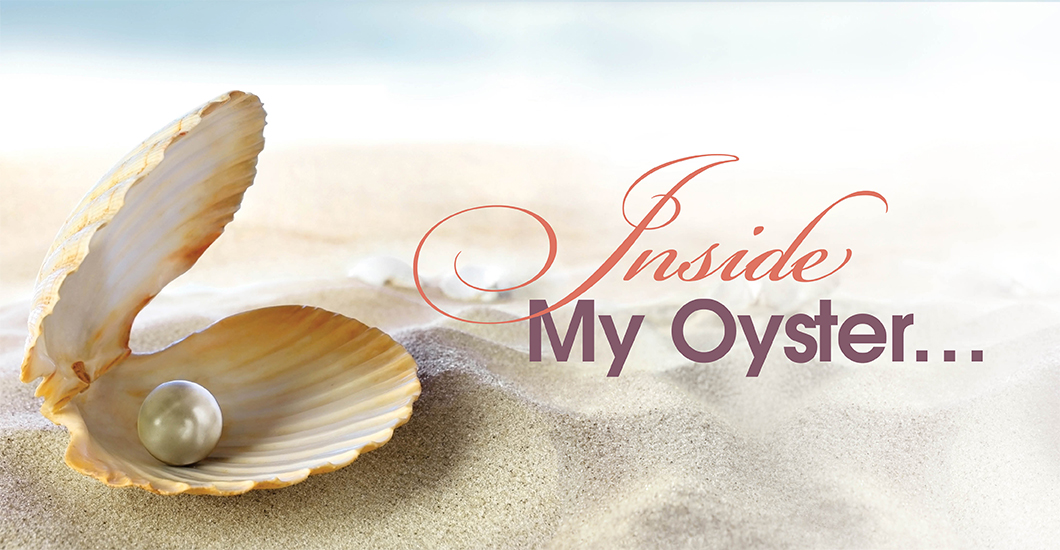
They say that pearls are formed around an intrusion, an unwanted foreign object that finds its way into its deeply protected shell. Once a foreign object enters the oyster shell, it secretes layers of the same luminous substance that is used to create the innermost part of its own shell. It continues to do so in concentric layers, eventually forming a shiny round pearl.
Oysters are not much to look at, and producing a pearl is not an oyster’s ultimate purpose. Yet, in the course of survival, as a device of self-protection, the oyster builds itself around an unexpected intrusion to bring forth beauty.
Amid the peace of a smooth-going life, when unwanted intrusions enter my heart and soul and threaten to eat me from within, does the oyster give me a lesson worth trying out? When failures, insurmountable barriers, any and every burden that was not mine in the first place end up within me by chance or by choice, can I secrete around it a thin layer of my innermost being?
I have found that if I try hard enough to point myself to The Giver of Eternal Love, my innermost being will be slowly filled with His being. As I gaze at the Eucharist for endless hours with nothing but gratitude, as I receive The Host into my soul with the greatest desire, as I sit down at His feet and listen with trust, that self-giving Love will slowly fill my soul.
Henceforth, with every little piece of disturbance that enters and threatens to disturb my peace, this Love within will cover it, one layer at a time. Eventually, precious pearls of saintly luminosity will be pried forth by The Expert Hand and adorn many lives with it.
'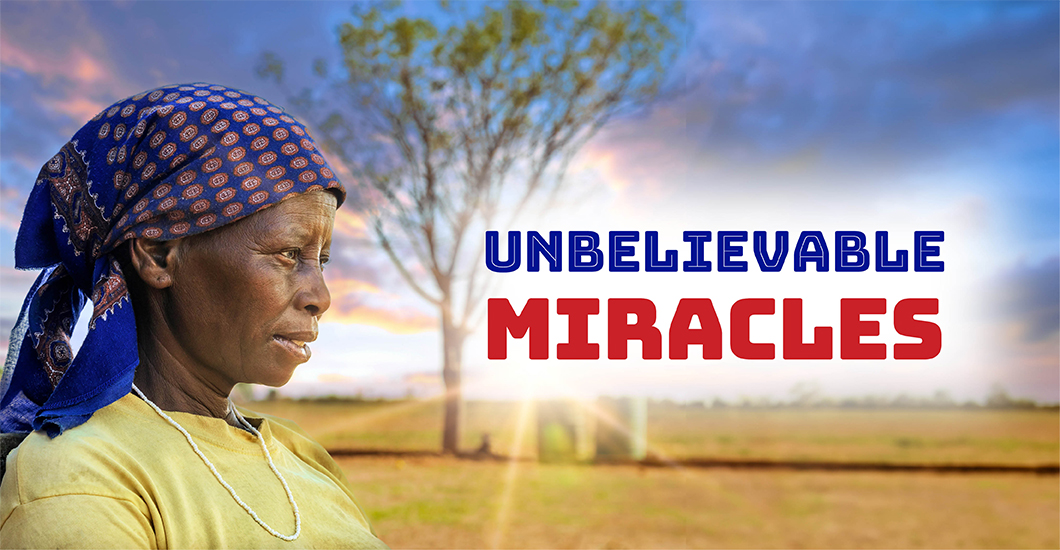
In the interiors of Nigeria, sans adequate resources or assistance, this priest witnessed unbelievable supernatural interventions
He was no stranger to fights. 6’2 with a black belt in kickboxing, he had a very colorful past before becoming a Catholic priest. But sensing divine direction, when he took on the assignment as the Superior of the Somascans in Usen, Nigeria, Reverend Varghese Parakudiyil got into what he calls the ‘ultimate brawl’—a direct war between good and evil in everyday life.
He had indeed moved into the hotbed for Juju, i.e., African witchcraft. The local witch doctors were highly regarded throughout the continent for their ‘powers.’ Among their clients were many prominent figures, including important political figures and even some local Christians. But, “where sin abounds, grace abounds still more” (Romans 5:20), and Reverend Varghese surely experienced the power of God like never before.
The very mention of the name of Jesus freed the afflicted from evil spirits; there was divine protection for Christians which the combined curses of the witch doctors could not penetrate, and many other powerful displays of divine power.
But one incident of supernatural intervention stands apart.
All that I Have
It was in October 2012, just a few weeks after Father Varghese had moved to Usen from India. One day a lady walked up to him, and after greeting him, she lifted up the portion of her dress over her stomach. To his horror, she removed a patch of black plastic sheet stuck on her stomach and uncovered a hole as big as an orange next to her belly button.
The hernia operation needed to heal her would take 400,000 nairas, something she could not afford: “Can you help?” she asked. The Reverend recalls that he was really broke, so he told her that he was not in a position to assist her. But, more as an act of dismissal, he encouraged her to get the operation done somehow…
As she slowly walked away, Reverend Varghese felt like seeing his own mother (who had passed away recently) leaving. Helpless and with a heavy heart, he whispered one of his sincerest prayers for her.
The Supernatural Clone
The Sunday before the New Year, a lady accompanied by her two daughters came up to the priest’s dwelling, carting a big bunch of bananas and a bag full of fruits and vegetables. Kneeling, she rubbed her palms together—a gesture that expressed either extreme gratitude or apology—and offered him the bananas and the bag. The priest was puzzled; though she looked strangely familiar, he couldn’t recognize her.
“Don’t you remember me, Father?” she asked. As she uncovered her stomach, he realized that it was the same lady who had come to him for help before. Now, she looked totally healed, obviously through an operation, because the suture marks were still visible.
When she thanked him, the priest was at a loss, unable to understand what he had done to warrant that gratitude. “Because you paid the bill,” said the confused lady. Totally baffled by her comment, he asked her to elucidate.
Following their fateful meeting, the lady had apparently got herself admitted to a hospital in Benin City for the hernia operation and hoped to be back home in time for Christmas and New Year celebrations. When she told the hospital staff that she would pay after the surgery, for some strange reason, they consented. Once the surgery was completed and she was taken back to her room, she told them she would go back home and sell her land to pay the bill. Understandably, they would not let her leave without paying. The next logical step would have been to hand her over to the police. But a little later, a nurse came into her room waving her bill and told her, “Praise the Lord, your parish priest just came and paid your bill. You can go now,” she added: “the Oyibo (as non-African foreigners are called), the tall one.”
Unexplained Mysteries
For Reverend Varghese, it was a wallop like nothing before! There were no other ‘Oyibo’ priests in the Benin City diocese at that time.
“It wasn’t me,” says Father Varghese, “If it was some other priest who paid the bill, praise God. But I believe that it was my guardian angel who did it.”
He is still unsure what gave the woman the nerve to get operated on without the money. Did she think that somehow the priest would manage to pay her bill? Or did she feel that being jailed was a better option than the suffering she was undergoing?
Humbled by these and many other experiences that convinced him of the Lord’s enduring providence, Reverend Varghese continues his ministry with zeal. He is presently handling dual roles as Superior at the Somascan mother house in Italy and as the Director of the International Novitiate. “Definitely not as action-packed as Africa or India, but this is God’s assignment for me now,” he humbly remarks.
'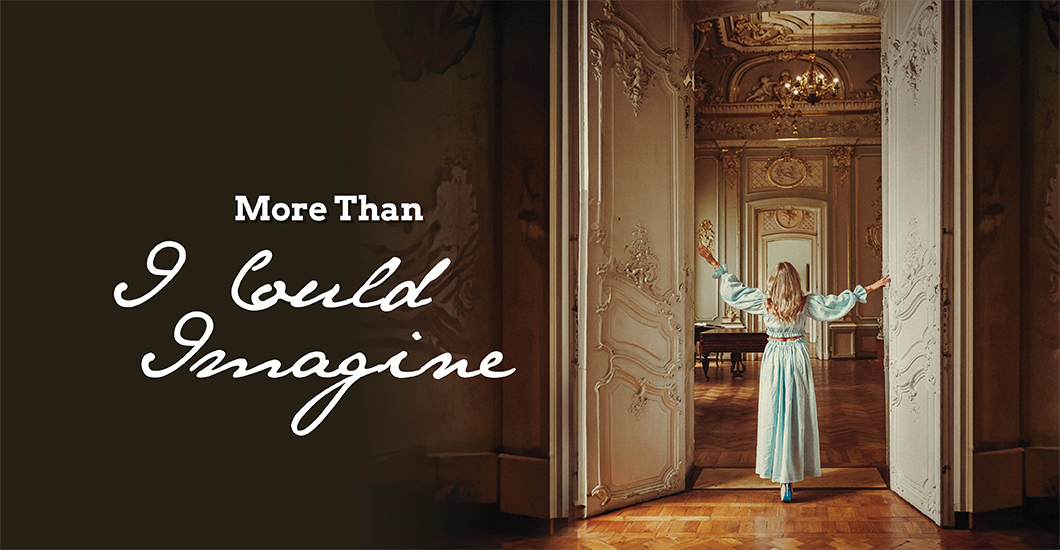
Are there doors in your life that refuse to open, no matter your efforts? Know the secret behind those closed doors through this heartfelt experience.
Opening the door to the Cathedral of Saint Jude, my husband and I found our seats amidst a large crowd gathered for the funeral of a woman I had met long ago when I was only 20 years old. She and her husband were the pastoral leaders of a Catholic Charismatic Prayer Community at the time. While she and I had not been close personal friends, she had touched my life in significant ways when I was involved with this dynamic faith-filled group. Her middle son, Ken, was now Father Ken, and that day was also the 25th anniversary of his ordination to the priesthood.
Scanning the congregation revealed many familiar faces from both my past and present. Father Ken’s touching tribute to his mother and the loving eulogies by his siblings reflected the impact the prayer group had on their own family, as well as many in attendance that day. Their words prompted memories to course through my mind—of how the Holy Spirit used this community to change many lives, especially mine.
Dragged into Love
I had been raised by two very devout Catholic parents who attended Mass daily, but as a teen, I only grudgingly participated in the life of the Church. I felt resentful of my father’s insistence on family Rosary every night and saying grace not just before meals but after as well. Attending the Adoration of the Blessed Sacrament on a Friday night at 10 PM didn’t bode well for my social status as a 15-year-old, especially when my friends asked what I had done over the weekend. Being a Catholic, for me then, was just about plenty of rules, requirements, and rituals. My experience each week was not one of joy or fellowship with other believers but rather one of duty.
Still, when my sister invited me to join her at her college’s weekend retreat the fall after I graduated from high school, I agreed. My small town offered little in the way of new experiences, and this would definitely be out of the norm for me. As it turned out, this retreat would set the trajectory for the rest of my life!
Between the warm camaraderie of the participants, as well as the huge smile that covered Father Bill’s face when he shared about the Lord with us, I saw something I had never seen in my home parish, and I knew that was what I truly wanted in my life: JOY! Near the end of the weekend, during the quiet time outdoors, I offered my life to God, not knowing exactly what that really meant.
Hopeless Cases
Less than two years later, my sister and I moved from the east coast of Florida to the west, first due to her job and later, because of my acceptance to a college in Saint Petersburg. Our efforts to find a place to live within our means were thwarted time and again due to the unwillingness of numerous apartment managers to rent a one-bedroom unit to two girls—even though we had shared a bedroom our whole lives and were sisters! Discouraged after yet another refusal, we stopped at the Cathedral of Saint Jude to pray. Knowing nothing about this Saint, we spied a prayer card and discovered that Saint Jude was the ‘patron of hopeless cases.’
After a bumpy search for affordable housing, our futile situation seemed to qualify as a hopeless case, so we knelt down to invoke Saint Jude’s intercession. Lo and behold, after arriving at the next apartment complex on our list, we were again greeted with the same hesitance. However, this time, the older woman looked at me, paused, and said, “You remind me of my granddaughter. I don’t rent one-bedrooms to two women, but…I like you, and I’m going to make an exception!”
We came to find out that the nearest Catholic Church to our new home was the Holy Cross, where a group called ‘Presence of God Prayer Community’ met each Tuesday night. Had we been able to rent any other apartment, we would not have been led to this group of joy-filled people we soon came to call ‘family!’ It was clear that the Holy Spirit was at work, and His presence was revealed time and time again in the 17 years I was actively involved in the group.
Completing the Circle
Returning to Saint Jude’s, the celebration of life that day was not only of our long-ago pastoral leaders, but it was also very much my own! Remembering my brokenness as a young adult and the loneliness and insecurity I felt at that time, I marveled at how the Lord had changed my life. He used His Spirit and His people to heal me emotionally and spiritually, filling my life with deep and rich friendships that have stood the test of time. He helped me discover the gifts He had given me—the community offered me a place to serve in various ways until I realized that my natural abilities, like that of organization, could be used for spiritual purposes.
After several years, I was invited onto a new Pastoral Team whose dynamic leader mentored me by example. Through his encouragement and support, I developed leadership skills that resulted in beginning new ministries to serve the ‘household of faith’ in the prayer community and the ‘least of these’ outside the doors of the church.
When a new parish began nearby some years later, I was asked to join the music ministry there, and with the Spirit’s prompting, I also participated in various other ministries. Bringing in all that I had learned and experienced over the years, I was able to set up many events that offered opportunities for healing, conversion, and growth within our parish community. For the last 14 years, I have been blessed to organize a women’s fellowship group begun by myself and a friend, who, like me, was changed by the love and care of Christian communities.
I have found all of God’s promises in the Scriptures to be true. He is faithful, forgiving, kind, compassionate, and a source of joy deeper than any I have ever thought possible! He has provided meaning and purpose in my life, and with His grace and direction, I have been able to partner with Jesus in ministry for over 40 years now. I didn’t have to ‘wander in the desert’ for those years, as did the Israelites. The same God Who led His people by the “pillar of cloud by day and pillar of fire by night” (Exodus 13:22) has led me day by day, year by year, revealing His plans for me along the way.
A song from my prayer group days lilts through my mind, “Oh how good, how wonderful it is when brothers and sisters live as one!” (Psalm 133:1). Looking around that day, I saw clear evidence of that. The Spirit at work in Father Ken’s mother brought much fruit from the seeds she planted, both in her home and in our community of faith. That same Spirit then brought forth a harvest from the seeds planted and watered in my life over the years.
The Apostle Paul said it best in his letter to Ephesians:
“Now to Him who is able to do immeasurably more than all we ask or imagine, according to His power that is at work within us, to Him be glory in the Church and in Christ Jesus throughout all generations, forever and ever. Amen!” (3:20-21)
'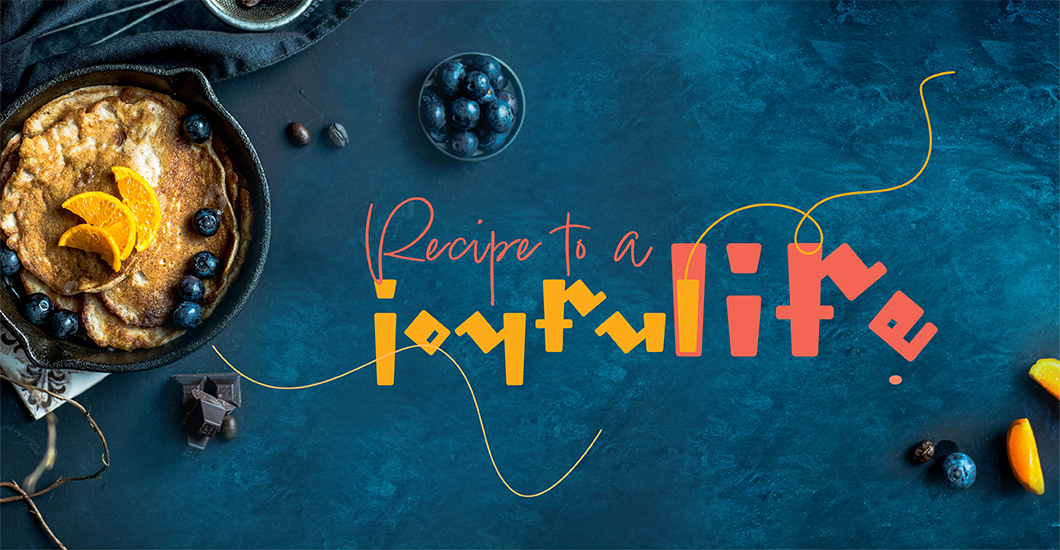
A winning combination is cooking within. Do you want a taste?
In 1953, Bishop Fulton Sheen wrote, “The vast majority of the people in Western civilizations are engaged in the task of getting.” These words still hold so much truth even today.
Let’s be honest. These days, there is a whole subculture of influencers whose lavish lifestyles are funded by a successful swaying of their followers to purchase particular products that they advocate.
Influence, consumerism, and greed abound. We desire the newest model of smartphones even before they hit the shelves. We want to get our hands on the trendiest items whilst they are still in vogue. We know that given the ever-changing trend pattern, it would not be too long before these same products are advertised through alternate media labeled ‘In Excellent Used Condition’ or, worse, ‘Brand New With Tags.’
“The massing of wealth,” observes Sheen, “has a peculiar effect on the soul; it intensifies the desire of getting.” In other words, the more we get, the more we want to get. This endless quest for gratification through wealth drains us and causes fatigue in our very being, whether we realize it or not.
So then, if amassing wealth is essentially an unquenchable desire, how do we find happiness, self-worth, and contentment in the consumeristic world that we live in?
Grit and Gratitude
Saint Paul directs us, “Rejoice always, pray without ceasing, give thanks in all circumstances; for this is the will of God in Christ Jesus for you” (1 Thessalonians 5: 16-18). Most of us would admit that this is easier said than done. But does that mean it is impossible?
Despite living a life of peril and strife, Saint Paul, one of the forefathers of Christianity, led by example. Was he imprisoned for promoting Christianity? Absolutely. Was his life in danger? Constantly. Was he shipwrecked, stoned, and ridiculed? Without a doubt.
And despite all of these—and more—challenges, Saint Paul regularly exhorted Christians, “Do not worry about anything, but in everything by prayer and supplication with thanksgiving let your requests be made known to God. And the peace of God, which surpasses all understanding, will guard your hearts and your minds in Christ Jesus” (Philippians 4:6-7).
In fact, gratitude and giving due thanks and praise to God was a recurring and, dare I say, constant theme of his correspondence to the Churches. From Rome to Corinth, Ephesus to Philippi, the early Christians were encouraged to give thanks—to be grateful—in all circumstances, not just the good ones.
Then, as now, this encouragement is both timely and confronting. However, being grateful in all circumstances requires prayer, effort, and perseverance.
Grateful and Giving
If we were to follow Saint Paul’s example and examine what we have with gratitude, what would that look like? Would we be grateful to have: a roof over our heads, money to pay the bills and feed the family, and enough to spend on little luxuries along the way? Would we be grateful for the family and friends we have around us, the vocation, and the talents that God has blessed us with?
Or would we still desire to blindly follow what’s trending and fritter away our money, energy, and happiness on things we don’t need and appreciate? Or could it possibly result in a more ordered and prudent approach to what we have and what we spend our money on?
Of course, the measure of our success in practicing gratitude is offset by the energy we put into it. Like any spiritual endeavor, we are not going to become proficient at gratitude overnight. It is going to take time and effort.
Slowly but surely, gratitude will color the way we see the world. In appreciating and being thankful for what we have and not chasing after more than we need, we are much better disposed to give to others rather than to receive ourselves. This combination of gratitude and giving is a winning combination.
Once again, Bishop Fulton Sheen agrees, “The reason it is more blessed to give than to receive is because it helps to detach the soul from the material and the temporal in order to ally it with a spirit of altruism and charity which is the essence of religion. There is more happiness in rejoicing in the good of others than in rejoicing in our own good. The receiver rejoices in his good; the giver in the joy of others, and to such comes the peace nothing in the world can give.”
Give gratitude a Go
Expressing gratitude involves the growth mindset. To grow in gratitude is to grow in self-knowledge, knowledge of God, and His plan for us. In separating ourselves from the cyclic nature of amassing wealth and the futile pursuit of happiness, we open ourselves up to finding happiness where we are.
We also ensure the right ordering of ourselves and our benefits as a result of God’s goodness. Like Saint Paul, we can recognize, “For from Him and through Him and to Him are all things. To Him be the glory forever. Amen.” (Romans 11:36).
This attitude of gratitude—which rolls rhythmically and poetically off the tongue—also helps us to see the silver lining in things that do not always turn out the way that we want them to. And this is the most poignantly beautiful aspect of gratitude, the spiritual aspect. As Saint Augustine explains, “God is so good that in His hand, even evil brings about good. He would never have permitted evil to occur if He had not, thanks to His perfect goodness, been able to use it.”
'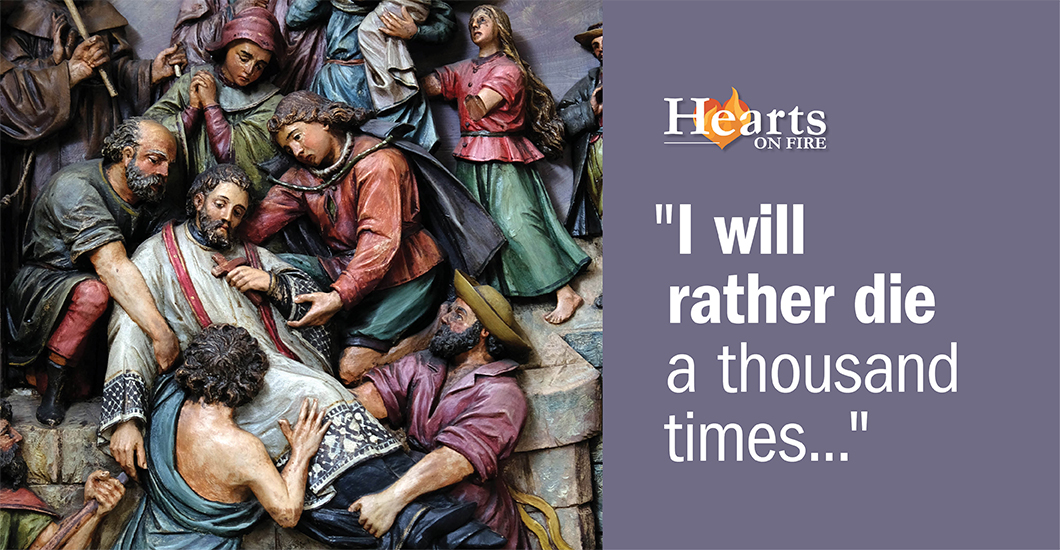
Do you know the first martyr who preferred to die rather than to reveal the secret of confession? In 14th-century Prague, there lived Father John Nepomucene, who was a famous preacher. As his fame spread, King Wenceslaus IV invited him to the court to settle arguments and take care of the needs of the people in the city. He eventually became the queen’s confessor, spiritually guiding her to patiently bear the cross of the King’s cruelty.
One day, the King, who was infamous for his outbursts of anger and jealousy, called the priest into his chambers and started questioning him about the queen’s confessions. Father John refused to reveal the confession secrets despite the King’s attempted bribes and torture; consequently, he was imprisoned. The King kept coercing him, and even offered him riches and honor in return. When he saw that bribery wouldn’t work, he threatened the priest with the death penalty. Father John was made to undergo all manner of torture, including the burning of his sides with torches, but even that would not move him.
Finally, the King ordered him to be put in chains, led through the city with a block of wood in his mouth, and to be thrown from Charles Bridge (the Karlsbrücke) into the river Moldau. The saint’s response remained the same and he exclaimed: “I will rather die a thousand times.” The King’s cruel order was executed on March 20, 1393. The body of John of Nepomuk was thereafter drawn out of the Moldau and entombed in the Cathedral of Prague.
In 1719, when his grave in the cathedral was opened, his tongue was found to be uncorrupted though shriveled. He was canonized by Pope Benedict XIII in 1729. Often pictured near a bridge with a finger to his lips and with five stars over his head, it is believed that on the night Father John was murdered, five stars were seen over the spot where he drowned. For his valiant act of faithfulness to the confessional norms, Father John Nepomucene is considered as the patron saint of confessors.
'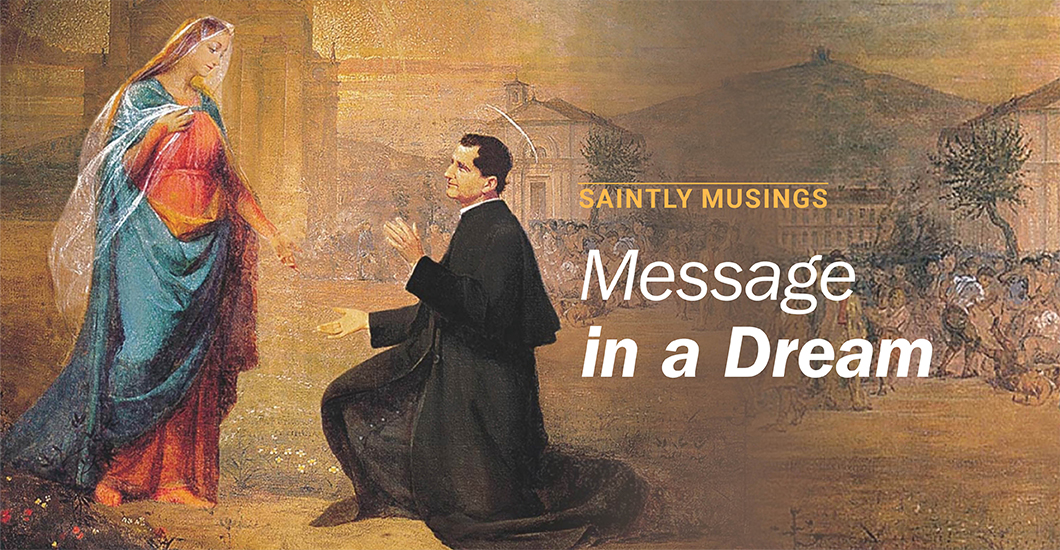
Saint John Bosco, in addition to the many spiritual gifts he was graced with, often had dreams that revealed heavenly messages.
In one of those dreams, he was taken to a meadow alongside the playground and shown an enormous snake coiled in the grass. Frightened, he wanted to run off, but the person who accompanied him held him back, asking him to get closer and take a good look. John was afraid, but his companion encouraged him to keep going, handed him a rope, and asked him to slap the snake with it. Hesitantly, John snapped the rope across its back, but as it sprang up, the snake got ensnared in the rope that had taken the shape of a noose. It struggled for a bit and died quickly.
His companion took the rope and put it in a box; upon opening the box a few minutes later, John saw that the rope had shaped itself into the words “Ave Maria.” The snake, a symbol of the devil, was defeated, destroyed by the power of “Ave Maria” or “Hail Mary.” If a single Hail Mary can do that, imagine the power of the Rosary! John Bosco took the lesson to heart and even received further confirmation of his trust in Mary’s intercession.
After the death of his dear student Dominic Savio, the saint had a vision of him in heavenly garb; this humble teacher asked the child saint what was his greatest consolation at the time of death. And he answered: “What comforted me the most at the moment of death was the aid of the mighty and lovable Mother of the Savior, Mary Most Holy. Tell this to your young people that they should not forget to pray to her as long as they live!”
Saint John Bosco later wrote, “Let us devoutly say a Hail Mary whenever we are tempted, and we’ll be sure to win.”
'
On life’s winding journey, it’s interesting to know that there are blind spots to look out for!
We know how important it is to check our car’s blind spots, especially before changing lanes, reversing, or turning. Unfortunately, we learn the hard way sometimes.
Lately, I’ve been struck with the notion that we all possess physical and spiritual blind spots. Jesus taught us to be wary of the latter when He said, “I have come into this world, so that the blind will see and those who see will become blind.” Some Pharisees who were with Him heard Him say this and asked, “What? Are we blind too?” Jesus said, “If you were blind, you would not be guilty of sin; but now that you claim you can see, your guilt remains” (John 9:39-41). What is Jesus telling us here?
We need to be very careful that we stay sitting at Jesus’ feet, heeding His instruction, learning from Him, and staying open to His corrections. As soon as we think we have ‘arrived’ or ‘have this Christian lifestyle down,’ we’re in dangerous territory. Our wisest thoughts, greatest sacrifices, and deepest loves are mere breaths compared to God’s infinite loving wisdom.
For we only see partially; we do not see the whole picture, the master plan. Only God does. Saint Paul puts it like this, “Now we see only a reflection as in a mirror, then we shall see face to face. Now I know in part; then I shall know fully, even as I am fully known” (1 Corinthians 13:12).
Learning the Hard Way
Looking back on my life, I recall that I was completely unaware of my pride, sins, shortcomings, judgments, presumptions, biases, fears, and lack of trust more times than one. Thankfully, God introduced people and events into my life, which helped uncover some of these areas of spiritual blindness.
I tend to learn the hard way. For years, I couldn’t quite put my finger on why one woman actively avoided me. It created a lot of tension, as we were in the same play-and-pray group. Eventually, I got the courage and humility to ask how I had offended her. The answer hurt like the dickens, and although we never became friends, at least now I am aware of one of my blind spots that were previously under the radar.
It takes a humble heart to allow people to remove splinters from our eyes. And our trouble is, we are not often humble enough.
There are many instances in my life when I was unaware of the harm that my unforgiveness, pride, need to control, tolerance for sin, or lack of gratitude caused. I do not wish to make a public confession here, but God has slowly been peeling off layers of spiritual blindness from me. Although it can be painful, I have gained greater spiritual freedom.
More to Learn Every Day
A wise friend once told me that she looks forward to Lent each year. I have never been one of those holy souls, so my ears perked up when she said that. She told me that she does not choose what she gives up or does for Lent. She lets her husband do that for her. I was absolutely floored by that concept.
What if we went to our spouse or a trusted fellow Christian and asked them how we could grow spiritually or what sinful habit we should confess?
So many times, our root sin is buried under more obvious issues. For instance, anger might be due to unforgiveness, worry might stem from the need to control, and perfectionism often involves pride. Most sins stem from a lack of trust in God’s goodness.
The Power of Direction
There is a real power that comes with being able to name your root sin. If you can identify it, you can repent and be free of it. However, root sins are tricky; they like to stay buried. A good regular confessor or spiritual director is a huge help. “Oh, if only I had had a spiritual director from the beginning, then I would not have wasted so many of God’s graces,” wrote Saint Faustina.
We can seek out accountability partners. God often uses other people to help us ‘see’ ourselves better. Family members, especially those who are actively following Christ, can be great blind spot checkers, as they see us at our best and our worst. And let’s not forget to simply ask God to reveal our blind spots to us.
What if we prepared for confession by asking the Holy Spirit to reveal an area of sin that we are oblivious to or ignoring? What if we did the same at the end of each day?
I particularly recommend seeking the advice of wise Christians before making big decisions. Just as it’s more important to check blind spots when we are planning to set out or change direction in a vehicle, we need to be extra careful to do the same when we are discerning our vocations, career choices, and other major life decisions.
Heavenly Father, give us humble, listening hearts so that You can change us for the better. Grant us Your vision to grow in our love for You and for our neighbors.
'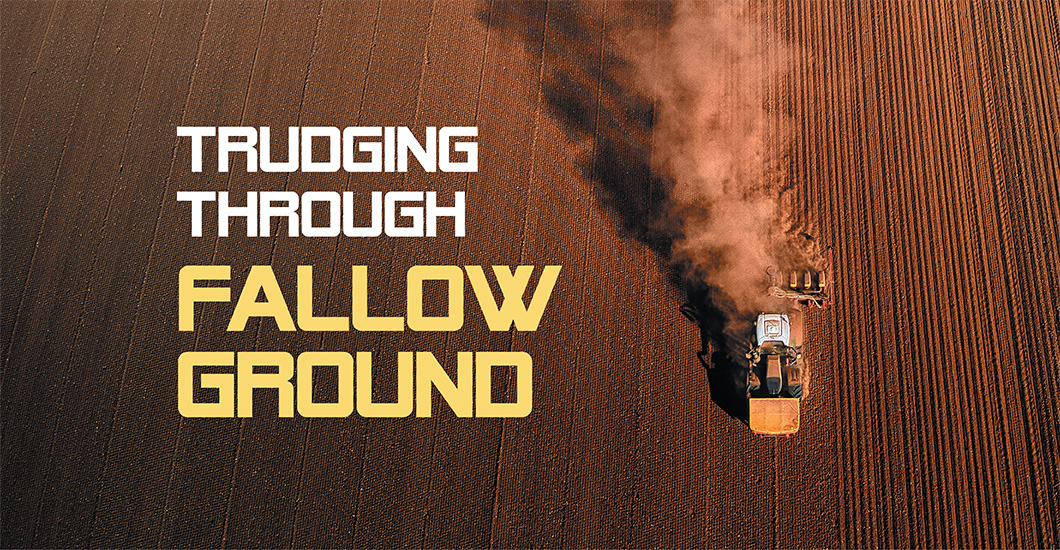
Never had I realized the actual meaning of “yoke” until…
Feeling a sense of heaviness this morning, I knew it was a clear call to spend an extended time of prayer. Knowing God’s presence is the antidote for all ills, I settled into my “prayer closet,” which, for today, was located on my front porch. Alone but for the birds chirping and a calm breeze sifting through the trees, I rested in the sounds of gentle worship music coming from my phone. I’ve often experienced the freedom that comes from taking my eyes off myself, my relationships, or the concerns of the world. Turning my attention to God reminded me of the verse from Psalm 22: “You are holy, enthroned on the praises of Israel” (3). Indeed, God inhabits the praises of his people.
I began to feel centered once again, free from the burdens hovering over our nation and world. Peace returned as I sensed my call was not to carry them but to embrace the yoke Jesus offers in the Gospel of Matthew: “Come to me, all you that are weary and are carrying heavy burdens, and I will give you rest. Take my yoke upon you, and learn from me; for I am gentle and humble in heart, and you will find rest for your souls.” (11: 28,29).
Hallmark of a Christian
Both of my parents grew up on farms. They may have seen two animals connected by a wooden crosspiece fastened over their necks, but I had not. I had always interpreted that verse by picturing Jesus partnering with us in life. He, shouldering the brunt of the load, and I, walking alongside, accomplishing what was mine to do with His help and guidance.
But recently, I learned that a “yoke” was a first-century Jewish idiom that meant something completely different from the agrarian image of oxen connected by their necks.
“Yoke,” as used by Jesus, refers to a rabbi’s collection of teachings. By choosing to follow the teachings of a particular rabbi, a person becomes his disciple and chooses to walk with him. Jesus, in effect, is saying, “I am showing you what it is like to walk with God.” It is not a duty nor an obligation but a privilege and a gift! Though I had experienced Jesus’ “yoke” as a privilege and gift, the “troubles of the world” he promised we would experience often dampened my joy that is to be the hallmark of a Christian.
During this morning’s prayer, I opened a book written nearly twenty-five years ago by a Franciscan priest, and turned to a page that sounded like it was written today:
‘When grace is no longer an experienced reality, it seems the realm of freedom is lost, too…It’s so easy to demonize the other side. We see it written large in elections in this country. All either party knows how to do is attack the other side. We don’t have anything positive to believe in, anything that is enlightened or rich, or deep. Negative identity, shallow as it is, comes more easily than dedicated choice. It is frankly much easier to be against than for. Even in the Church, many have no positive vision forward so they lead the charge backward or against. Note that Jesus’ concept of ‘the Reign of God’ is totally positive—not fear-based or against any individual, group, sin, or problem.’ (Everything Belongs, 1999)
Bit by Bit
The heaviness I’d been feeling resulted not only from the divisiveness in our country but also between those in my own circle who, like me, call Jesus “Lord,” yet seem unable to honor the different call and path of another. Knowing that Jesus restored dignity to those whom society had shamed, shouldn’t this be what we, as His followers, seek to do for one another? Including, not excluding; reaching out, not turning away; listening, not condemning.
I struggled with it myself. It was hard to understand how others could see things in a way that to me seemed contrary to the Christian message, yet they had the same difficulty in looking through the lens through which I now viewed the “yoke” of Jesus. I’d learned years ago the value of having a “teachable” spirit. It is easy for us to feel we have the only truth, yet, if we are steadfast disciples, we will continually expand our vision through not only prayer but through reading, meditating on Scripture, and listening to those wiser than ourselves. Whom we choose to allow into a place of influence over us is paramount. Persons of tested faith and integrity who have lived “lives worthy of their calling” deserve our attention. Above all, the example of those who model love, seeking the good of all, will help us grow and change over the years. Our character will be refined, bit by bit, as we are being “transformed into the image of Christ.”
If we, in all our enlightenment, still feel we must speak the truth as we understand it, even with the love that is to accompany it, it is all too easy to err in thinking that we are the voice of the Holy Spirit in someone’s life! Only God knows the heart, mind, and obedience of a life lived for Him. The work of His Spirit and the response of another are not our jurisdictions.
Certainly, a good parent would not point the finger at a young child and insist they act like an adult. A good parent understands that it takes many years, much teaching, and a good example for the child to mature. Thankfully, we have a very Good Parent! Psalm 22 came to mind again. The same psalm that Jesus quoted from the cross, at the depths of His pain and suffering, ends with the reminder that each generation will tell their children about the good things the Lord has done. Grace abounds, and freedom follows. I determined again to offer both to those I don’t understand and don’t understand me.
The One with whom I am yoked for life shows me the way.
'